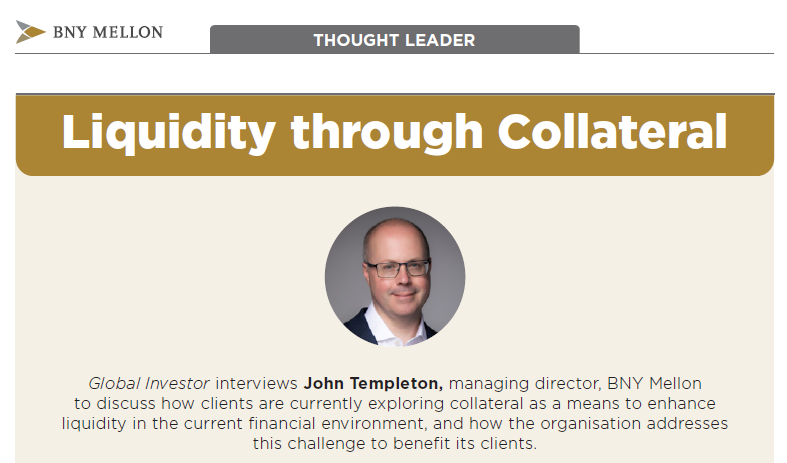Provable Markets' CEO Matt Cohen on securities lending

Reimagining securities lending
Matt Cohen, CEO of Provable Markets, explains the benefits of the SFT Clearing Service and how the Firm’s ATS, Aurora, is set to reshape the securities lending industry.
This Thought Leadership article is part of the 2022 Autumn Magazine, which can be accessed here.
Aurora arrives as the first new SEC Registered Alternative Trading System (ATS) for securities finance in over a decade. The cloud-native offering from Provable Markets is architected from the ground up using a modern technology stack that seeks to digitize workflows, optimize pre and post trade management, and reduce operational risk. Aurora launches as the only regulated access point to the Depository Trust and Clearing Corporation’s (DTCC) novel Securities Finance Transaction (SFT) Clearing Service. Approved by the SEC in June, the offering introduces central clearing of securities lending transactions via the DTCC’s equity clearing subsidiary the National Securities Clearing Corporation (NSCC).
The new Service has innumerable benefits, and, paired with Aurora, has the potential to pragmatically reset the US securities lending market structure more broadly.
Central Clearing as a springboard for modernization
By introducing novation at the point of trade into the securities lending space, the Service provides high flexibility for participants of all shapes and sizes. In the current landscape, firms are increasingly faced with the need to diligently consider a complex set of capital and balance sheet inputs and outputs in their decision making which have a significant impact both directly and indirectly on financial market participants.
The SFT Service is thoughtfully designed to offer the maximum benefits of a CCP. In-scope participants can realize a Risk Weighted Asset (RWA) exposure of 2%. Even if not directly impacted, the pass-through effects of this portend for significant cost savings to customers of Agent Lenders and Prime Brokers. Furthermore, SFTs are structured as overnight term trades that are automatically rolled by Aurora, leading to enhanced flexibility for balance sheet netting and other related opportunities for capital efficiency.
These benefits are enhanced by the advent of the Approved Submitter to the SFT Clearing Service. Unlike subsidiary FICC’s Sponsored Repo program, the NSCC has structured the offering such that SFTs and their entire life cycle are managed by a central source of truth before reaching the CCP for clearance and settlement.
Automation, Digitization, and Risk Mitigation
With the ability to operate a true marketplace with a common contra, Aurora centralizes liquidity, while retaining for Subscribers the ability to submit pre-established loans for central clearing. The Subscriber-driven high and low touch trading flexibility is designed to account for a highly subjective and variable set of factors that go into the decision making for each SFT.
Aurora automates processes while maintaining interoperability within the current infrastructure; offering a modern API architecture in unison with fully backwards compatible integration. For SFT, all life cycle events are pre-matched and managed on platform. The resulting solution is free of trade breaks, T+1 reconciliation, and contract compare. Automated roll messages update the unit price of the SFT and loan economics daily for both parties, significantly reducing operational risks and providing participants a more tangible handle on their day-to-day cash flows and collateral requirements.
Maximize the Benefits Of Broader Liquidityon
Bilateral contracting has arguably been one of the biggest challenges in the securities lending industry. Master Securities Lending Agreement (”MSLA”) negotiations - which often take months (or more) of negotiation at significant cost, with credit and risk assessments looming upon completion - limit the potential number of counterparties one can trade with. An SFT without an MSLA as a necessity was not possible until now. Other costs to transacting, such as Agent Lending Disclosure of Principal regulation (“ALDOP”), Single Counterparty Credit Limits (“SCCL”), and indemnification, when structured properly, are either eliminated or are, at the very least, afforded greater discretion to the underlying beneficial owner or borrower.
Maximizing all of these benefits, especially the diversification of counterparties and creditworthiness is a futile exercise without the proper supporting infrastructure. Aurora expands participant’s, both large and small, ability to unleash the potential of this structural change to the market. The ATS’s architecture takes into consideration all the nuances of the securities finance markets to bring a cash equity like functionality into the hands of traders. At the core, a basic crossing mechanism brings forth a tangible order book style marketplace to the securities lending space. From there, careful and deliberate layering of smart order router style algorithmic suites allows participants to have as much or as little control in the automation of their day to day workflows as possible.
This is just the beginning for Aurora. Over the coming months and years new products, features, and partnerships will continue to help customers of all profiles reap the benefits of a neutral, modern, and feedback driven platform.
Found this useful?
Take a complimentary trial of the FOW Marketing Intelligence Platform – the comprehensive source of news and analysis across the buy- and sell- side.
Gain access to:
- A single source of in-depth news, insight and analysis across Asset Management, Securities Finance, Custody, Fund Services and Derivatives
- Our interactive database, optimized to enable you to summarise data and build graphs outlining market activity
- Exclusive whitepapers, supplements and industry analysis curated and published by Futures & Options World
- Breaking news, daily and weekly alerts on the markets most relevant to you






